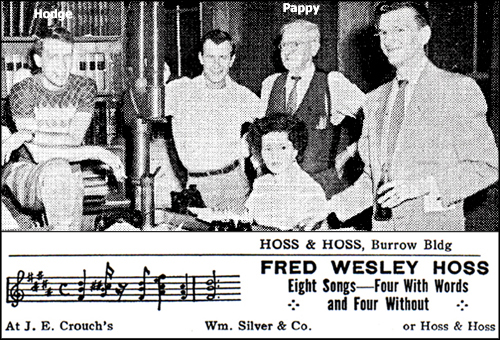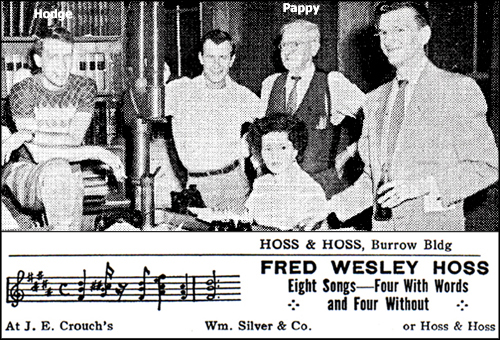The late Tom Hodge of the Johnson City Press introduced his readers to early businessman, Fred Hoss, numerous times over the years. Fred wrote an article for the Johnson City Chronicle on Sunday, May 21, 1922 titled “Henry Johnson Realized His Dream.” Since the city founder married Mary Ann Hoss, daughter of John Hoss, perhaps Fred was a descendant of that early family.

An advertisement in a 1913 City Directory shows “Hoss & Hoss, Shorthand Reporters; Specialists, Law and General Reporting, Stenography and Typewriting; 15 years experience. Additionally, the business is listed in the Business Directory under “Shorthand Reporters.”
Another ad from that directory reads “Fred Wesley Hoss; Eight Songs, Four With Words and Four Without; located in the Burrow Building at 240.5 E. Main.” Oldsters will identify the address as being the Nettie Lee Ladies Shop.
A 1915 Chamber of Commerce publication classifies the business as “Shorthand Reporter, Stenographic Artist” saying, “Mr. Hoss is a young man, a native of East Tennessee, of good standing and enjoying the most enviable reputation in his line of work throughout East Tennessee, Western North Carolina and Southwest Virginia. He has been engaged in stenographic work for 17 years, becoming a member of the International Shorthand Reporters’ Association in 1904.”
In a 1986 article, Tom Hodge made some comments about Fred: “You’ve got to be an older Johnson Citian to know about Fred W. Hoss. He died in the early 1950s after a long life in Johnson City in which he served, among other things, as newspaper reporter, editor and historian.” When Tom started working at the Johnson City Press-Chronicle as a nightside sportswriter, “Pappy” Hoss, as he was known, was night editor. He ruled the newsroom from his desk, sitting there erect wearing a bowtie. Everything on his desk was neatly arranged – pencils, rulers, scissors, paste pot and stacks of state, national and international printouts taken from the clacking Teletype machine.
At the annual newspaper Christmas party, “Pappy” demonstrated his mastery of the piano by playing a variety of diverse compositions. Frank Tannewitz once brought Tom a songbook that he had purchased from Henry Frick at the Music Mart. It was one with eight songs, four with words and four without, published in 1912 by Hoss and Hoss and copyrighted by Fred Wesley Hoss.
The instrumentals were “The Victor’s Return,” “Dream Song,” “Bridal Song” and “December Morning.” The vocals were “The Memory Rose,” “The Year and You,” “My Fairy” and “Crossing the Bar” (solo and male quartet). “Pappy” dedicated each selection to a different person. Tom’s wife served as a critic, playing the eight pieces and offering an objective and favorable evaluation of them.”
The Press had a Coke machine in the newsroom that accepted only nickels. If someone needed a nickel, “Pappy” would make change for them by charging them a dime and a penny in exchanged for two nickels. The staff reciprocated the favor by assessing Fred a fee for special favors. On a cold night, “Pappy” would ask someone to fetch his LaSalle car that was parked a block away. That person subsequently charged him a penny for the service.
Hoss had the curious habit of shutting down the front page of the upcoming morning paper around 9:00 at night and it took an earth-shaking news event to convince him to revise the page after that hour.
“You just don’t find “Pappy” Hosses in our business anymore,” said Hodge. “When he died, Johnson City lost not only a fine old-fashioned newspaperman but also one of the city’s top historians, too.” The same can be said of Tom Hodge.

Comments are closed.